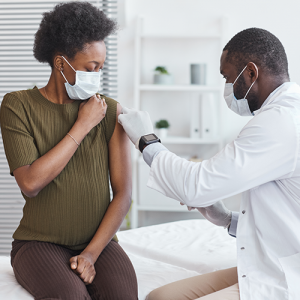The importance of the COVID-19 vaccine for pregnant and recently pregnant people
As the third year of the COVID-19 pandemic begins, vaccines remain a hot topic. Compared to 2020, we are now able to take advantage of all the research that has been done regarding the effects of COVID-19 infections, as well as the safety of the COVID-19 vaccine.
 This information is especially important for those who are wondering whether or not to get the COVID-19 vaccine if they are pregnant, recently had a baby or plan to get pregnant soon. But at The Mother Baby center, a partnership between Allina Health and Children’s Minnesota, we’re here to help!
This information is especially important for those who are wondering whether or not to get the COVID-19 vaccine if they are pregnant, recently had a baby or plan to get pregnant soon. But at The Mother Baby center, a partnership between Allina Health and Children’s Minnesota, we’re here to help!
We talked with Dr. Anna Drewry, a physician specializing in Obstetrics and Gynecology at Allina Health Mercy Women’s Health Clinic, about the COVID-19 vaccine and pregnancy.
“My job is to educate and help people to have healthy, safe pregnancies. Because of this, I strongly encourage my patients to get vaccinated against COVID-19,” said Dr. Drewry. “There is no data to show the vaccine is harmful to a pregnancy, and there is evidence to show it can protect against the dangerous effects of a COVID-19 infection.”
The vaccine is safe
The answer is clear, the COVID-19 vaccine is safe. The American College of Obstetricians and Gynecologists (ACOG), “Strongly recommends that pregnant individuals be vaccinated against COVID-19,” as well as those who are breastfeeding or contemplating a pregnancy. Booster shots are recommended for people in these groups as well.
Most people have a mild flu-like reaction after they get the vaccine – this is your body’s natural response to the vaccine to start to produce protective antibodies – but more serious reactions are very rare. Side effects are similar between pregnant and non-pregnant people.
Increased risk without the vaccine
If you are pregnant or were recently pregnant, you are more likely to get severely ill from COVID-19 compared to other people in similar health. This includes the possibility of needing a ventilator to help you breathe, intensive care unit (ICU) admission and even, death.
The Centers for Disease Control and Prevention (CDC) says, “Pregnancy causes changes in the body that could make it easier to get very sick from respiratory viruses like the one that causes COVID-19.”
Getting COVID-19 while you are pregnant can cause complications related to pregnancy such as preterm birth (delivery earlier than 37 weeks) or stillbirth. Complications may be higher in pregnant people who also have other medical conditions, such as diabetes or obesity.
However, getting vaccinated during or prior to your pregnancy can reduce your risk of getting a COVID-19 infection or making the illness less severe.
The COVID-19 vaccine can help your baby, too!
ACOG also found that vaccinated individuals produced antibodies in their breastmilk and umbilical cord blood. A recent study by the CDC showed that being vaccinated during pregnancy reduced the risk of infant hospitalizations for COVID-19 by 61%.
What if you have already had COVID-19 infection?
People wonder this a lot. ACOG specifically points out that people who have had COVID-19 before should still get vaccinated. In fact, one study showed that people who were vaccinated showed higher levels of antibodies than those who had a COVID-19 infection. This means that the vaccine has been shown to be even more effective in preventing someone from getting COVID-19 more than once.
Benefits outweigh risks
Dr. Drewry says, “Bottom line, there is a lot of information demonstrating that the vaccine is safe for pregnant individuals and is not harmful for the pregnancy.”
It can protect against a COVID-19 infection, which can cause pregnancy complications. Plus, if you get the vaccine while you’re pregnant or breastfeeding it can actually build antibodies that might protect your baby!